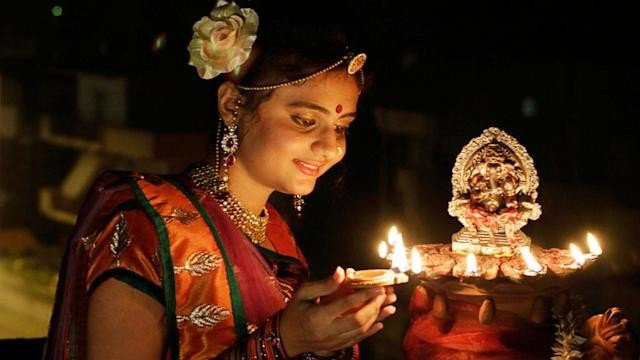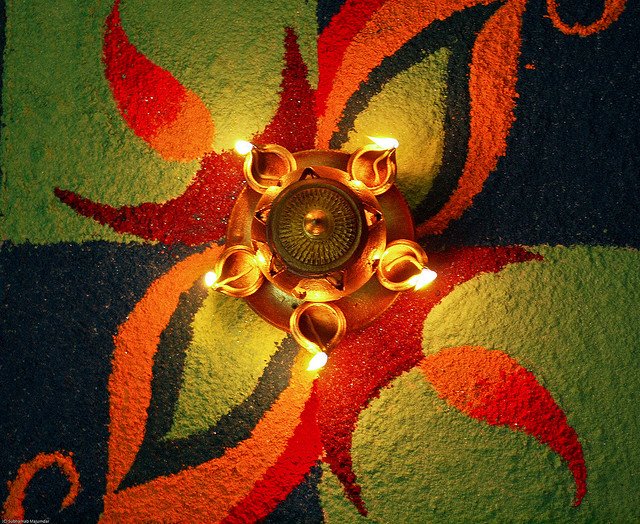Diwali, literally translating as a row of lights is India one’s of most widely celebrated festivals, celebrated with great enthusiasm in all regions of India.It is known as the Festival of Lights because of the brightly lit lamps (diyas) and the light emitted from the bright and colorful crackers. It’s a day when people adorn their houses with diyas and China lights and pipe lights on their walls.

Unlike major festivals like Christmas that fall on a particular date, Diwali has no fixed date. Its dates depend on the cycle of the moon. The festival lasts for approximately five days, the first one being Dhanteras when people splurge money on buying expensive jewellery and utensils, or cars and other new vehicles as it is considered a very pious day for shopping. The Diwali celebrations in this year, ie 2013 will start on 3rd November, the main “festival of lights” being celebrated on 5th November. The festival proceedings end after a period of 5 days from the beginning, the last day is known as Bhau-beej which will be celebrated on 7th November 2013.
Recommended for you:
How to celebrate Diwali
Diwali is celebrated by Hindus and Jainas across India, Sri Lanka, Myanmar, Mauritius, Fiji, Malaysia, Guyana, Trinidad & Tobago, Nepal and Surinam. For Jainas, Diwali is not celebrated to mark the homecoming of Lord Rama after spending 14 years in exile or the defeat of Ravan, but instead it is to mark the date of attainment of niravana or Moksha by Mahavira in 527 BC. Presently, Diwali is becoming more of a heterogeneous festival In India, with even Muslims and Christians participating in the Diwali proceedings like bursting crackers, though they do not participate in the prayers.
For Hindus, Diwali is probably the most important and exciting festivals of the year. The preparations include a lot of shopping and also handmaking delicious sweets. The houses are whitewashed and painted. New clothes and other gifts are bought especially for children but also for adults. There is a lot of enthusiastic group prayers in which all members of the family or society are bound to take part. The people pray to Laxmi (The Hindu goddess of Wealth), praying for their well being and success, and businessmen leave their shops open as an invitation fro Laxmi to enter their shops which are elaborately decorated. On the main day, a national holiday is observed. Families gather together, go to temples with large offerings and buy or make sweets. Sweets and other gifts are also distributed among neighbours, their society members and the poor. Diwali is marked with a lot of generosity. Needless to say there are a lot of crackers. In fact sellers make immense profit in these days as crackers can range anything between Rs 5 to Rs 10,000. Cracker shows are organized all over cities and the children have a wonderful time. The look on the Children face’s while seeing the crackers burst into a multitude of colours and sparkles is of pure happiness and contentment. The adults have to take special care of their young ones and also their pets, as there are quite a few casualties during Diwali. That said, Diwali is nevertheless quite fun.

A strange practice followed in Diwali which will rarely be found in other Hindu festivals is that there is gambling and drinking! Huge gambling circles are organized where there are huge stakes, and quite a few losses incurred but it is all in keeping with the spirit of Diwali. People are also permitted to drink which is not considered holy/traditional by Hindus but it is a custom widely followed.
Diwali is a festival of families coming together, children celebrating with their grandparents and joining in the household activities. Everyone dresses up in beautiful traditional attire and create a lot of happy memories while eating the yummy delicacies prepared during Diwali. Everyone looks forward to Diwali and its celebrations because it is a festival that celebrates the inner Light of human beings, one which is filled with compassion and a need for attainment of knowledge, joy and success.